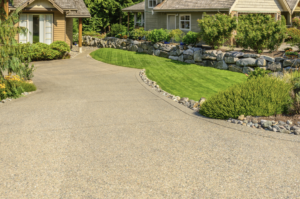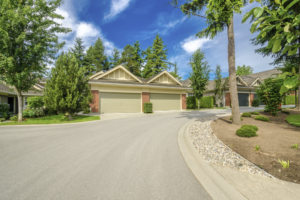When it comes to paving a driveway, parking lot, or private road, two materials dominate the conversation: asphalt and concrete. Both have their strengths, and both come with trade-offs. Choosing the right one depends on your needs, your budget, and your long-term expectations. So, which is better? Let’s take a closer look.
Durability and Performance Over Time
If you’re looking for something that handles heavy use and doesn’t flinch at temperature swings, asphalt comes out swinging. It’s flexible, which allows it to expand and contract with changing weather. That means fewer cracks in colder climates and less chance of damage under heavy vehicle loads. Concrete, while incredibly strong, is more rigid. When it cracks—and it will—it’s harder to repair and usually more expensive to fix.
That said, concrete tends to have a longer overall lifespan if properly maintained, often lasting 30 years or more. But here’s the catch: those repairs, when they’re needed, can be costly and intrusive. Asphalt may need resurfacing more often, but the process is quick, straightforward, and budget-friendly.
Installation Speed and Cost
If time and money matter—and let’s be honest, when don’t they?—asphalt wins again. Asphalt is faster to install and generally less expensive upfront. You could have a new driveway ready to use in a couple of days. Concrete takes longer to cure, and if you’re working with decorative finishes or stamped designs, the price tag can climb fast. So, if you’re looking for a cost-effective, quick-turnaround option that still delivers quality, asphalt is hard to beat.
Maintenance and Upkeep
Every surface needs some TLC to stay at its best. Asphalt requires more routine maintenance, like sealcoating every few years, but the fixes are fast and affordable. Concrete, while low-maintenance on the surface, becomes a lot more work when problems arise. Cracks are difficult to hide, patching often looks out of place, and full replacements can be pricey.
With asphalt, you can maintain that clean, dark finish with minimal effort. And regular sealing doesn’t just improve the look—it adds years of life to the surface.
Climate Considerations
Where you live plays a big role in what material makes the most sense. Asphalt thrives in colder climates because of its flexibility. It’s less likely to crack under freeze-thaw conditions, and it absorbs heat, which helps snow melt faster in winter. Concrete fares better in warm, dry environments. In colder regions, it can be more prone to cracking and spalling from salt and ice treatments. If you live in a place with harsh winters, asphalt gives you the edge. If extreme heat is your biggest concern, concrete might be worth a second look.
The Final Verdict
So, which is better—asphalt or concrete? The answer depends on what matters most to you. If you want something affordable, fast to install, easy to maintain, and well-suited for colder climates, asphalt is the clear choice. If you’re aiming for a high-end, long-term surface and don’t mind paying more upfront, concrete might be your match.
At Walt’s Paving, we’ve worked with both materials and helped countless property owners choose the right one for their specific needs. When you’re ready to pave with confidence, we’ll make sure you get a surface that’s built to last, no matter what you choose.
How can Walt’s Paving help?
You can count on Walt’s Paving to complete your residential or commercial paving project in an efficient and timely manner. We have over 40 years of experience paving asphalt driveways, making asphalt repairs, and sealcoating asphalt. We are located in Osceola, IN, and service homeowners and businesses within 50 miles of Elkhart, IN. Call us today.







